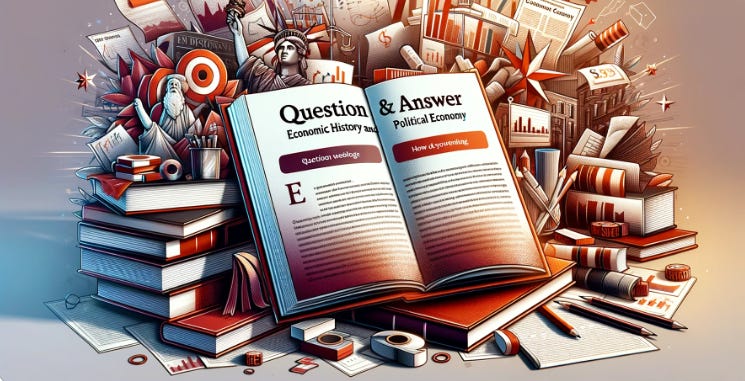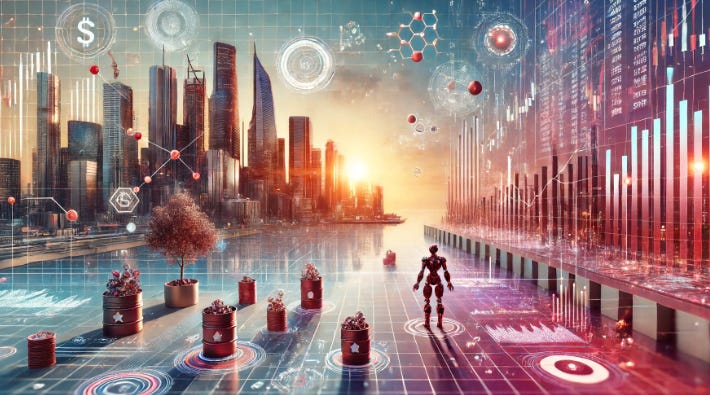WEEKLY BRIEFLY NOTED: For 2024-07-05 Fr
Richard Baldwin on shifts in globalization; Neil Dutta on the likelihood the Fed’s high-rate policy will choke the economy; the truly extraordinary dysfunctional ego of Yale law professor Akhil...
Richard Baldwin on shifts in globalization; Neil Dutta on the likelihood the Fed’s high-rate policy will choke the economy; the truly extraordinary dysfunctional ego of Yale law professor Akhil Reed Amar; very briefly noted; In seven days now Biden has not shown he can do anything other than read off a teleprompter; presidential immunity is the most unoriginalist idea ever; Martin Wolf on how democracy hangs in the balance this year; good inflation indices say there is no “last mile” inflation problem; how good or useful are GPT LLMs as summarization engines?; the belief that expansionary fiscal policy has boosted r* right now is incoherent; looking for a good course on management cybernetics & its management-consultant friends; all the PCE numbers see inflation at target right now; the New York Times fake-pretends that vote shifts in a close election are unimportant; & office hours: six questions; my Project Syndicate review of Dan Davies’s The Unaccountability Machine; Slouching on Sean Kenny’s podcast; notes, columns, & papers for June 2024; Dan Drezner: the choice is Biden or Harris; READING: Garry Wills on Pat Buchanan back in 1992; reviewing John Ganz’s When the Clock Broke: WEEKLY BRIEFLY NOTED: For 2024-06-27 Th…
ONE VIDEO: Richard Baldwin: The Big Shift in Globalization:
The third major shift in globalization is the movement of offices and services across borders. It follows the first shift which was the rise in the trade of staple goods, and the second which was the offshoring of factories. Service-led growth in trade is now more significant than manufacturing export-led growth, and emerging markets should adapt their strategies accordingly:
Three Cascading Constraints Framework: Globalization evolves based on the cost of moving goods, information, and services, impacting the nature and effects of global trade.
Great Divergence and Convergence: From 1820 to 1990, rich countries gained a larger share of global income, followed by a shift since 1990 where India and China have been increasing their share.
Decline in Goods Trade: The peak in the global goods trade share occurred in 2008.
Localization of Supply Chains: Since 2012, manufacturing supply chains have become shorter and less dense.
Service Trade Growth: Unlike goods trade, service exports, particularly ICT-enabled services, have not slowed: they continue to grow rapidly.
Emerging Markets in Service Trade: Developing countries' share of ICT-enabled services is growing faster than that of developed countries.
Barriers to Service Trade: Barriers to service trade are much higher than those for goods, but these barriers are rapidly decreasing due to digital technology.
Comparative Advantage in Services: Emerging markets can leverage comparative advantages in providing quality, cost-effective services directly to developed markets.
Infrastructure and Development: Investing in digital infrastructure is more cost-effective than traditional manufacturing infrastructure.
Urban-Based Growth: Service-led development will likely be urban-centered, focusing on cities with strong digital infrastructure.
Policy Recommendations: Governments should focus on education, digital infrastructure, and urban development to capitalize on the opportunities presented by the new phase of globalization.
ONE AUDIO: “Lots More” with Neil Dutta on a Looming Fed Policy Error
Neil Dutta, the top economist over at Renaissance Macro, has generally been sunny and optimistic about the economy over the last four years or so. But now he's warning of a possible mistake by the Federal Reserve. In his view, the central bank is waiting too long to get confirmation that inflation is coming back to target. Meanwhile, unemployment is starting to creep up in a meaningful way. As he sees it, if you're still worried about upside risk to inflation at this point, you need to have a theory about where that inflation is going to come from — and it's really hard to come up with an answer for that right now, given the general downward momentum in hiring and the overall economy. In this episode of Lots More, we catch up with Neil to talk about the risk that the Fed will blow the soft landing.
<https://overcast.fm/+5AWPo4mgY>
TWO IMAGES: The Extraordinary Ego of the Yale Law Professor:
Does Akhil Reed Amar imagine that there is anyone in the world whose reaction to him at this point is not: Shut up and go away?
Very Briefly Noted:
Political Economy: I find it interesting that Niskanen is calling not for state-capacity liberalism but rather state-capacity capitalism. I would have focused on the need to disempower incumbents who see change is bad—who see themselves not as having social power to benefit from better technology and higher populations but rather as having some rent-based position that they might lose. It is their insistence on veto points that has debilitated the governance structure. I do think that pushing forward the "Abundance Faction" within the Democratic Party, as suggested by Steve Teles and Rob Saldin, is the path most likely to be successful. I mean: Who are you gonna talk to on the Republican side? J.D. Vance?: David Dagan: How to build the abundance movement: ‘One major cause of… scarcity is that incumbents have captured governance of these sectors so as to limit the entry of competitors. American government… debilitated by complexity and a culture of extreme risk aversion and disregard for implementation. This dysfunction makes the American state incapable of bold action…. How will people who believe in the above propositions build power around them?… Steve Teles and Rob Saldin arguing that the likeliest path to success is for an “Abundance Faction” to rise within the Democratic Party…. Misha David Chellam… “Abundant v. moderate”…. “From stakeholder capitalism to state-capacity capitalism” [by] Didi Kuo…. More essays are in the works… <https/://hypertextjournal.substack.com/p/how-to-build-the-abundance-movement>
Economics: A high-pressure economy—I concept I learned from Janet Yellen at the start of the 1990s—forces employers to find innovative solutions to labor shortages and supply bottlenecks, which has profound implications. Businesses cannot afford to be overly selective: they must invest in training and development. Moreover, only when the economy is "taut"—that is, operating at a high level of demand—can you see where supply bottlenecks, and hence high profits from alleviating them, really exist. There is still more: periods of low unemployment see significant benefits in labor-force participation among disadvantaged groups. A high-pressure economy not only drives growth through output and productivity but also fosters equity: Julie Coronado: The US economy is benefiting from the higher-pressure effect: ‘Bond markets have been understandably nervous with budget deficits in the US projected at 6 per cent of gross domestic product for the foreseeable future and neither presidential candidate is particularly focused on fiscal sustainability. But the classic comparison of Japan (250 per cent debt to GDP) and Argentina (86 per cent debt to GDP) illustrates that fiscal space and sustainability are more about the viability and resiliency of the overall economic model than simple budget metrics. Stability and expanding prosperity begets more stability and favourable fiscal trade-offs… <https://www.ft.com/content/59ef05e1-c711-4a34-a5c8-ea5e94789eb2>
Neofascism: Authoritarians get things done only when there are a lot of people “working ahead of the Führer”, either out of commitment, a desire to get a promotion, or simply a desire to avoid trouble. When you don’t have that, authoritarianism turns very unproductive very quickly: Scott McCloud: ‘Consider Timothy Snyder’s Rule #1… ‘1. Do not obey in advance. Mot of the power of authoritarianism is freely given…. Individuals think ahead about what a more repressive government will want, and then offer themselves without being asked. A citizen who adapts in this way is telling power what it can do… <https://bsky.app/profile/scottmccloud.bsky.social/post/3kc7tkar3wd2f>
Not only does a court that is so ignorant that it confuses pollutants with laughing gas have less than zero competence at understanding substantive issues at stake, but I have also seen powerful evidence that the current Supreme Court majority has less than zero competence at resolving statutory ambiguities: David Corn: ‘Shot: Supreme Court Justice John Roberts in the "Chevron" decision: "Perhaps most fundamentally, Chevron’s presumption is misguided because agencies have no special competence in resolving statutory ambiguities. Courts do." Chaser: “Supreme Court Corrects EPA Opinion After Gorsuch Confuses Laughing Gas with Air Pollutant”… <https://twitter.com/DavidCornDC/status/1806705360486429042>
NIMBYism: Hopeful. But never underestimate the willingness of NIMBYs to find additional obstacles to throw more sand in the gears: J. K. Dineen: S.F. becomes first California city to miss its housing goals. The impact will be massive: ‘The majority of housing projects in San Francisco will now be eligible for over-the-counter approval… cut[ting] the average time frame for approvals from two years to under six months. On Friday, the California Department of Housing and Community Development ruled that San Francisco did not meet its housing permitting goals in 2023, making it the first city in California to be subject to Senate Bill 423…. About 23% of housing built in San Francisco is under a development agreement and would not be eligible for SB423. The rest will likely use the legislation for faster approvals… <https://www.sfchronicle.com/sf/article/s-f-housing-goals-19545405.php?sid=60bf8f1b09882c0292318763&ss=A&st_rid=7cc6ce9a-594b-4197-abca-45b07cf19a7b>
MAMLMs: First, are there actually going to be any benefits to producers? Users of MAMLMs will find something valuable in them, yes. But the producers who have the scale to create and deploy and maintain the systems all start from positions of massive oligopolistic power, and are already very close to maximizing revenue: if they could charge more and make more money, they already would have. The coming of MAMLMs substantially raises the cost of maintaining their moats. But does it enable them, as a group, to capture more revenue? I do not (yet) see how: M.G. Seigler: Almost All A.I. Investments are Going to Zero: ‘There will probably be a handful of AI companies that eventually earn that 1,000x or 10,000x return. But… a lot of the value is likely to accrue to the current largest players in tech because they have the capital and capacity to feed the AI beasts. And Microsoft is… double-dipping here…. Most of these AI deals are going to zero… faster than we're used to…. And many are going to go to zero in more spectacular fashion given the aforementioned amounts of capital being pumped into the system at an incredible pace. So as an investor, what can you do?… You can't miss the 10,000x. Even if you perhaps already have. Personally, I'd fall back to simply betting on people. It's the only real constant. It doesn't always work because most startups don't work, but the "right" entrepreneur gives you a better shot… <https://spyglass.org/ai-investment-crash/>
“Wisdom of crowds”—that is definitely a thing. But are MAMLMs the best way to implement the harnessing of WoC? I remain very skeptical. It seems to me potentially more promising to divide up the space, and to consider separately (i) natural-language interfaces to data collections, and (ii) large-scale high-dimensional large-data very-flexible regression and classification. Those are two different things, likely to be pulling humanity in very different directions: Henry Farrell: : ‘It is really nice to see a research paper that… build[s]… foundations for… an AI-as-means-for-channeling-collective-intelligence research agenda…. These models [are] not… capable of becoming reasoners… through… magical… emergence, but rather… extract… diverse forms of human knowledge…. Lowering the temperature to approximate simple majority voting…. Combining the diverse perspectives of relatively uninformed human beings can provide better understanding… <https/://www.programmablemutter.com/p/when-ais-outperform-the-experts-that>
Public Reason: We do not have the discipline of cybernetics we need to answer these questions with any confidence at all: Henry Farrell: Dictators are plagued by information problems too: ‘We've no good evidence that China does it better than the U.S…. We look at authoritarian systems as information dampeners… we think of democracy as a set of mechanisms for open information aggregation…. But… a world where information is (a) cheap, but (b) having it early gives you an advantage, there is likely to be a lot of wasteful and perhaps destabilizing contention and shouting in an open information system, but closed ones may be able to manage it better…. [Do] authoritarian systems… work in this way in the specific and practical rather than the aggregate and theoretical[?]… Jeremy Wallace…. Seeking Truth and Hiding Facts: Information, Ideology and Authoritarianism in China…. A tournament system with backscratching among different political clans of officials…. This system has arguably had real benefits for China: GDP growth has gone up, and not just in the fake statistics. But it has increasingly distorted the Chinese economy… <http/s://www.programmablemutter.com/p/dictators-are-plagued-by-information>
Before modern times, democracy did not spread far or last long—it was almost always, Madison and Hamilton agreed, about to be or already a shitshow. They hastened to assure their readers that they should vote for the 1787 Constitution none the less, for there had been powerful “advances in the science of government”. Madison may have believed this. Hamilton was talking his book. Thus the questions are: What made 1776 to 2000 different? And are the things that made it different still working?: Noah Smith: How liberal democracy might lose the 21st century: ‘A scary little theory about information and freedom…. In a world of cheap information, tournament effects — costly, wasteful, negative-sum competitions over the private control of information — might dominate…. We should continue fighting for liberal democracy, and hope that technology and human nature allow for its continued victory. We should try to tweak our institutions to prevent our time from being cannibalized by information tournaments — restraining the excesses of high finance, limiting campaign spending in order to give legislators more time to govern, directing more capital to long-term risky high-tech projects, and so on. Liberalism may or may not still have the advantages it had in the 20th century, but whether or not it does, we shouldn’t give it up without a fight… <https://www.noahpinion.blog/p/how-liberal-democracy-might-lose>
Central Country: For more than half a generation no one could successfully copy Henry Ford, and only masses of engineers driven out of the company by Henry allowed GM to rise. Is BYD about to find itself in the same position?: Danny Lee: Why BYD’s Wang Could Be China’s Version of Henry Ford: ‘Patents… are among the invisible assets turning Wang’s company into the world’s biggest EV maker. After selling 3 million electric and hybrid vehicles in 2023 and logging $85 billion in revenue, it’s on course to overtake Tesla Inc. this year. Now Wang is further disrupting China’s EV industry with cars costing less than $10,000, bringing affordable transport to the masses… <https://www.bloomberg.com/news/articles/2024-06-24/byd-s-wang- -china-s-henry-ford>













I confess I haven't read Project 2025. What is the planned date for Kristallnacht? And the Reichstag fire?
Just my weekly reminder that these large-scale correlation models being marketed as "AI" are being created by planetary-scale theft of the intellectual property of others - and that neither copyright offices nor courts are going to stop that theft.